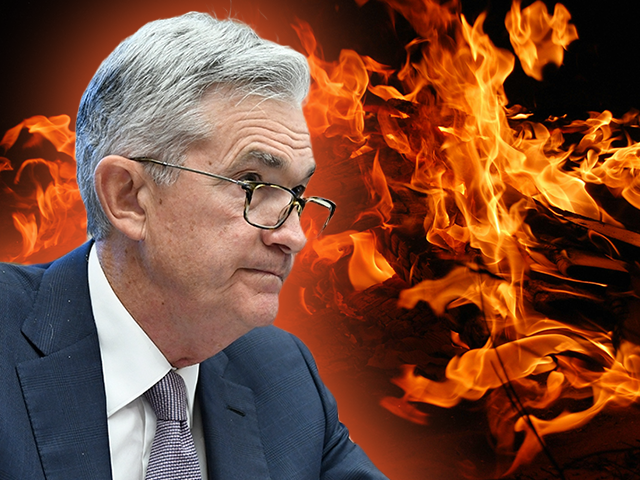from Sky News Australia
Large Upward Revisions of “Core Services” PCE Inflation Pushed Six-Month “Core” PCE Inflation to 3.4%, Worst in a Year
by Wolf Richter
Wolf Street
 Fed’s Wait-and-See on rate cuts makes sense amid heavily revised whiplashy data and still too high inflation.
Fed’s Wait-and-See on rate cuts makes sense amid heavily revised whiplashy data and still too high inflation.
The revisions, the upward revisions, oh-la-la! The Bureau of Economic Analysis released today the PCE price index for June; and as part of it, the “core” PCE price index – the Fed’s primary yardstick for inflation – was revised substantially higher for May, driven by a large upward revision of the “core services” PCE price index. So the much-hailed month-to-month core PCE reading a month ago of +1.0% annualized (+0.08% not annualized) was revised up to +1.5% annualized (+0.13% not annualized).
Your Food is More Expensive – Are U.S. Corporate Profits to Blame?
Many companies such as Chipotle and McDonald’s are seeing profits jump as they continue raising prices, an analysis finds
by Tom Perkins
The Guardian
 As inflation shot to its peak around mid-2022, Chipotle’s prices also rose, pushing up what customers paid for burritos and bowls by as much as several dollars. Since then, the fast casual restaurant’s costs have broadly fallen. Prices have not.
As inflation shot to its peak around mid-2022, Chipotle’s prices also rose, pushing up what customers paid for burritos and bowls by as much as several dollars. Since then, the fast casual restaurant’s costs have broadly fallen. Prices have not.
Chipotle’s decision to maintain high prices helped boost profits 110% in recent years, while its executives boasted to investors that they raised prices higher than inflationary costs.
Chipotle’s sparkling financials are representative of much of the food industry, according to a Guardian analysis of financial documents and earning calls transcripts from 36 top US food corporations.
Core Inflation Cools but by Less Than Expected
by John Carney
Breitbart.com
 The Federal Reserve’s go-to inflation gauge showed a slight easing of inflation in June and consumer spending remained solid, bolstering the argument that the Fed’s policy could be “just right” and undermining calls for an urgent rate cut.
The Federal Reserve’s go-to inflation gauge showed a slight easing of inflation in June and consumer spending remained solid, bolstering the argument that the Fed’s policy could be “just right” and undermining calls for an urgent rate cut.
The core personal consumption expenditures (PCE) price index, which omits food and energy costs, ticked up just 0.2 percent from May, which annualizes to a 2.2 percent increase. Over the past year, it is up rose 2.6 percent, according to Friday’s data from the Bureau of Economic Analysis. The year-over-year figure was slightly higher than expected.
Inflation-adjusted consumer spending also climbed 0.2 percent, with May’s numbers seeing a positive revision.
On a three-month annualized basis, core inflation dipped to 2.3 percent, the lowest since December. The six-month annualized rate is a still high 3.4 percent.
Breitbart Business Digest: Growth and Inflation Are Too Hot for the Fed to Cut in September
by John Carney
Breitbart.com
 Economic Growth Rips Higher Than Expected
Economic Growth Rips Higher Than Expected
Economic growth picked up more than expected in the spring, not only undermining the case for rate cuts but also raising the possibility that the Federal Reserve still has not done enough to cool the economy off to bring inflation down to its two percent target.
The Bureau of Economic Analysis said Thursday that real gross domestic product (GDP) expanded at a 2.8 percent annual rate in the second quarter. That is twice the pace of the 1.4 percent recorded in the first quarter of the year and significantly stronger than the two percent consensus forecast.
Consumer spending, the engine of the U.S. economy, rose at a 2.3 percent annual rate in the April through June period, matching the rate of growth in the first quarter and defying expectations for a slowdown. This contributed about 1.6 percentage points to growth.
Rep. Nanette Barragán Says Democrats Need ‘Four More Years’ to Push Through the Policies Needed to Lower Inflation and High Cost of Living
by Jack Hellner
American Thinker
 The Democrat party is full of economic illiterates, and here’s the latest example, from a report out at Breitbart News:
The Democrat party is full of economic illiterates, and here’s the latest example, from a report out at Breitbart News:
Dem Rep. Barragán: Biden Needs ‘Four More Years’ to ‘Finish the Implementation’ of Policies to Lower Prices
On Friday’s broadcast of MSNBC’s ‘José Díaz-Balart Reports,’ Rep. Nanette Barragán (D-CA) stated that people still have concerns about prices, but President Joe Biden is asking Congress to do things like rent control and has a plan to lower prices and ‘he needs four more years to finish the job, to finish the implementation of these policies, to build on them to help the American people.’
(Now of course this was before Joe Biden dropped out of the race, but since Kamala Harris is being anointed as the nominee without any input from the Democrat voter base, and she’s cut from the same cloth and Biden’s own right-hand man, we can rightfully assume she would carry on with Biden’s economic approach.)
Have We Been Living in an MMT World Since 2008?
by Joseph T. Salerno
Mises.org
 I recently viewed Finding the Money, a video aimed at persuading a popular audience of the putative merits of Modern Monetary Theory (MMT). The video debuted this past May on several streaming platforms and theaters throughout the U.S. Whether it succeeded or not in its purpose, I will leave it for others to judge.
I recently viewed Finding the Money, a video aimed at persuading a popular audience of the putative merits of Modern Monetary Theory (MMT). The video debuted this past May on several streaming platforms and theaters throughout the U.S. Whether it succeeded or not in its purpose, I will leave it for others to judge.
What I found most noteworthy in the 95-minute video was a brief clip of an interview with George Selgin, an economist of some stature in free-market monetary policy circles. When questioned about what MMT proponents get wrong or factually incorrect, Selgin waffles a bit and replies, “it’s a matter of emphasis and rhetoric.” He then goes on to give a more definite answer: “The MM theorists do say there is ultimately a scarcity of resources. But too often, they treat the world as if the norm is one of generally unemployed resources and plenty of ‘em.” Here, Selgin seems to be challenging MMT’s central claim that politicians and bureaucrats can costlessly conjure up real resources to expend on their favorite programs simply by creating and spending fiat money.
Gold Rises After Sharp Sell-off, Focus Shifts to U.S. Inflation Data
by Polina Devitt
Reuters.com
 LONDON, July 26 (Reuters) – Gold prices regained some ground on Friday after falling sharply in the previous session, ahead of key U.S. inflation data that could offer more cues on when interest rate cuts will start.
LONDON, July 26 (Reuters) – Gold prices regained some ground on Friday after falling sharply in the previous session, ahead of key U.S. inflation data that could offer more cues on when interest rate cuts will start.
Spot gold rose 0.3% to $2,370.5 per ounce by 1110 GMT, but was down 1% so far this week. Prices had hit their lowest since July 9 on Thursday after stronger-than-expected U.S. economic growth data.
“That’s a bearish factor for gold prices, which tend to fare worse during times of economic strength when other assets perform more positively,” said Frank Watson, market analyst at Kinesis Money.
Inflation Remained Low in June
by William J. Luther
The American Institute for Economic Research
 Federal Reserve officials have been hoping for evidence that inflation is returning to target. The latest data from the Bureau of Economic Analysis (BEA) should give them some confidence. The Personal Consumption Expenditures Price Index (PCEPI), which is the Fed’s preferred measure of inflation, grew at a continuously compounding annual rate of 0.9 percent in June 2024, bringing the three-month average annualized rate down to 1.5 percent. The PCEPI has grown 2.5 percent over the last year and 3.7 percent per year since January 2020, just prior to the pandemic. Prices today are 8.8 percentage points higher than they would have been had the Fed hit its 2-percent inflation target over the period.
Federal Reserve officials have been hoping for evidence that inflation is returning to target. The latest data from the Bureau of Economic Analysis (BEA) should give them some confidence. The Personal Consumption Expenditures Price Index (PCEPI), which is the Fed’s preferred measure of inflation, grew at a continuously compounding annual rate of 0.9 percent in June 2024, bringing the three-month average annualized rate down to 1.5 percent. The PCEPI has grown 2.5 percent over the last year and 3.7 percent per year since January 2020, just prior to the pandemic. Prices today are 8.8 percentage points higher than they would have been had the Fed hit its 2-percent inflation target over the period.
Core inflation, which excludes volatile food and energy prices, also remains low. Core PCEPI grew at a continuously compounding annual rate of 2.2 percent in June 2024, and 2.3 percent over the last three months. Year-on-year core PCEPI growth is now 2.6 percent, compared with the 3.6 percent core PCEPI inflation realized per year since January 2020.
Kamalaflation: How Harris Caused Inflation by Casting Decisive Votes for Biden’s Economic Agenda
by John Carney
Breitbart.com
 Democrat strategists hope that Kamala Harris can avoid responsibility for the inflation surge that soured the public on President Biden but the critical role she played in passing the legislation that fueled the worst price increases in four decades will make that a challenge.
Democrat strategists hope that Kamala Harris can avoid responsibility for the inflation surge that soured the public on President Biden but the critical role she played in passing the legislation that fueled the worst price increases in four decades will make that a challenge.
The Biden-Harris administration’s sweeping $1.9 trillion American Rescue Plan passed a deeply divided Senate in March of 2021 only after Harris cast the tie-breaking vote in favor of the pandemic spending bill that even prominent Democrat economists had warned would overheat the economy.
Republicans voted unanimously against it, criticizing the measure as unnecessary, unaffordable, and dangerously inflationary.
Frustration Over Bills, Inflation Could Shape 2024 Presidential Election
by Susan Tompor
Detroit Free Press
 More often than not, I’m asking economists about things like the Federal Reserve, the jobless rate and the outlook for auto sales. Typically, I’m not bringing up second-hand conversations with hairdressers.
More often than not, I’m asking economists about things like the Federal Reserve, the jobless rate and the outlook for auto sales. Typically, I’m not bringing up second-hand conversations with hairdressers.
But lately, such conversations can matter when you consider whether, somehow, Vice President Kamala Harris might be able to put 10,000 miles between her and the shocking 40-year high for inflation that hit in June 2022.
It turns out, everyday conversations can tell you a great deal about economic angst and why some people think the U.S. economy stinks. The economy is lousy, you say, even when the U.S. unemployment rate was a mere 4.1% in June?
